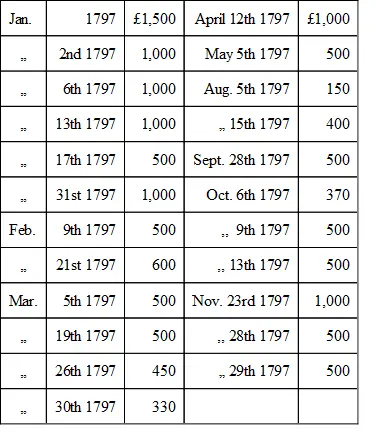Thomas Walker - The Depot for Prisoners of War at Norman Cross, Huntingdonshire. 1796 to 1816
Здесь есть возможность читать онлайн «Thomas Walker - The Depot for Prisoners of War at Norman Cross, Huntingdonshire. 1796 to 1816» — ознакомительный отрывок электронной книги совершенно бесплатно, а после прочтения отрывка купить полную версию. В некоторых случаях можно слушать аудио, скачать через торрент в формате fb2 и присутствует краткое содержание. Жанр: foreign_prose, История, foreign_edu, foreign_antique, на английском языке. Описание произведения, (предисловие) а так же отзывы посетителей доступны на портале библиотеки ЛибКат.
- Название:The Depot for Prisoners of War at Norman Cross, Huntingdonshire. 1796 to 1816
- Автор:
- Жанр:
- Год:неизвестен
- ISBN:нет данных
- Рейтинг книги:3 / 5. Голосов: 1
-
Избранное:Добавить в избранное
- Отзывы:
-
Ваша оценка:
- 60
- 1
- 2
- 3
- 4
- 5
The Depot for Prisoners of War at Norman Cross, Huntingdonshire. 1796 to 1816: краткое содержание, описание и аннотация
Предлагаем к чтению аннотацию, описание, краткое содержание или предисловие (зависит от того, что написал сам автор книги «The Depot for Prisoners of War at Norman Cross, Huntingdonshire. 1796 to 1816»). Если вы не нашли необходимую информацию о книге — напишите в комментариях, мы постараемся отыскать её.
The Depot for Prisoners of War at Norman Cross, Huntingdonshire. 1796 to 1816 — читать онлайн ознакомительный отрывок
Ниже представлен текст книги, разбитый по страницам. Система сохранения места последней прочитанной страницы, позволяет с удобством читать онлайн бесплатно книгу «The Depot for Prisoners of War at Norman Cross, Huntingdonshire. 1796 to 1816», без необходимости каждый раз заново искать на чём Вы остановились. Поставьте закладку, и сможете в любой момент перейти на страницу, на которой закончили чтение.
Интервал:
Закладка:
To put an end to the complaints and the recriminations continually renewed on both sides, relative to the treatment of the prisoners, our Government had in October 1797 proposed the fresh arrangement “that the Prisoners should be furnished, in the Country where they were detained, with clothing, subsistence, and medicines at the expense of the Government to which they belonged.” The French Government took no notice of this communication, not even acknowledging its receipt, and to enforce its attention to this and other matters connected with the exchange of prisoners (especially of Sir Sidney Smith), the British Government threatened to confine all the officers out on parole, and to reduce the prison ration, which was at that time equal to that of a British soldier, to half—viz. 1 lb. bread, ½ lb. beef, ¼ lb. pease, and ½ lb. cabbage.
This threat, aided possibly by M. Charretie’s letter—the piteous appeal of a servant of the Republic thwarted in the execution of his duties by the neglect of the Directory to fulfil its promises and to discharge its responsibilities—had effect. The new arrangement was adopted, each nation undertaking to provide food, medicine, and other necessaries for its own countrymen. While this arrangement lasted, neither combatant could use the weapon, which Britain had threatened to employ, the reduction of the ration of those of the enemy who were captive in its prisons. M. Gallois, who succeeded M. Charretie as commissary, brought over M. Nettement, to whom the special task of providing the means of subsistence for the prisoners was entrusted, the expense being borne by France.
The contention that the complaints made by the French as to the food, etc., supplied under the old system, were mostly unfounded, is supported by the fact that M. Nettement, except in one instance, employed the same sub-agents, and, in general, the same contractors, who had been serving the British, and that only slight modifications in the dietary were made to adapt it more to French methods of cooking. The new arrangement lasted only two years; it was terminated abruptly by an Arrêté of the French Consuls, dated 29th November 1799 (le Frimaire l’an 8 de la République une et Indivisible). A copy of this edict was sent by M. Niou (the Commissary in England at that date) to Mr. Dundas, Secretary of State for War, with a letter in which he stated that among other reasons why the Consuls did not in any manner feel called upon to continue to observe the arrangement, was the fact “that it was not founded on any authentic stipulation; that the Cartel of Exchange, signed nearly ten months afterwards, took not the least notice of it,” etc.
In consequence of this correspondence on the 15th December 1799, the Duke of Portland, acting in the absence of Mr. Secretary Dundas, communicated to the Admiralty the King’s wishes as to future arrangements. After protesting against the “departure (on the part of the French Government) from the agreement entered into between the two countries, and which tended so materially to mitigate the calamities of war,” he directed, as to the British prisoners in France, that Captain Cotes, the British agent in Paris, should ascertain exactly the daily allowance made to each man by the French Government, and that he should, at the expense of the British Government, make up any deficiency existing between that allowance and the ration supplied by the British Government during the years 1798 and 1799. At the same time the Minister directed the Transport Commissioners to supply the French prisoners in Britain, from the date when the French agent ceased to supply them, with the same rations of provisions as were granted before the arrangement of December 1797, and he adds:
“As no mention is made of Clothing or other necessaries in Captain Cotes’ letter, I think it right to add that the Commissioners of Transports and for taking care of Prisoners of War are on no account to furnish any to the French Prisoners, as this charge has at all times been supported by the French Government.”
From this time to the termination of the war the arrangement as to the feeding of the prisoners remained the same, but a terrible source of misery to the French prisoners at Norman Cross, and to other French prisoners of war in England, was the firm refusal of the French Government to agree to the clause in Lord Portland’s letter, referring to the clothing of the prisoners.
In another Edict, dated March 1800, signed by Buonaparte as First Consul, Article 1, is “The Ministers of War and of the Marine shall ensure by every possible means, subsistence and clothing to the Russian, Austrian and English Prisoners of War”—“they shall take care that they are treated with all Attention and Indulgence consistent with public safety.” 40
Конец ознакомительного фрагмента.
Текст предоставлен ООО «ЛитРес».
Прочитайте эту книгу целиком, купив полную легальную версию на ЛитРес.
Безопасно оплатить книгу можно банковской картой Visa, MasterCard, Maestro, со счета мобильного телефона, с платежного терминала, в салоне МТС или Связной, через PayPal, WebMoney, Яндекс.Деньги, QIWI Кошелек, бонусными картами или другим удобным Вам способом.
1
Fortescue: History of the British Army , iv. 904–6. Clode: Military Forces of the Crown , i. 240.
2
The Story of Dartmoor Prison , by Basil Thomson. (London: William Heinemann. 1907.)
3
The French Prisoners of Norman Cross . A Tale by the Rev. Arthur Brown, Rector of Catfield, Norfolk. (London: Hodder Brothers, 18, New Bridge Street, E.C.)
4
Vattel, Les Droits des Gens , book iii, chap, iii, sec. 49, p. 150.
5
“Prisoners of War,” Chambers’ Journal , No. 21, 1854, p. 330.
6
It will be seen in a later chapter what class of men the prisoners were to whom these words would come home.
7
July 1797— Reports House of Commons , “18th Report of Committee of Finance.”
8
In 1803 the Earl of Carysfort of the Irish Peerage took the title of Lord Carysfort of Norman Cross, as a Peer of the United Kingdom.
9
The price of timber had risen in December 1806 to £8 8 s. a load; at one date the contractor complained that even by paying £12 a load he could not obtain fifty loads in Plymouth. The Story of Dartmoor Prison , Basil Thomson. (London: William Heinemann, 1907.)
10
The sum of £14,800 was paid to Adams between the 1st January 1797 and 29th November 1797 in the following instalments:

The total amount paid to 19th November 1797 for the Norman Cross Prison was £34,518 11 s. 3 d. , for Hull £22,600, for Lewes £12,400, and for Colchester £15,620.
11
As illustrating the hardship which, already in its fourth year, this war had imposed upon the nation, the following extract from the report furnished to the Transport Office, by Captain Woodriff, R.N., agent to the Commissioners, of the average price of provisions and the rate of wages in the district in which the Depot had been established, during the time that the prison and barracks were erecting, may be of interest. Mutton was 10½ d. per lb., beef 1 s. per lb., bread 1s. per quartern loaf. Carpenters’ wages were 12s. per week, shoemakers’ 10 s. , bakers’ 9 s. , blacksmiths’ 8 s. , and husbandmen 7 s. Starvation wages were then a literal truth. Four years later from a Parliamentary Report we find the Government granting a bounty on all imported wheat, in order to keep the price down to £5 a quarter, other grain being treated in the same way. We can well understand that, as the price of provisions went up, and the taxation increased with the prolongation of the war (a war which, however it originated, was prolonged for years by the ambitious projects of Buonaparte for the aggrandisement of himself and of France), the animosity not only of the actual combatants, but also of the suffering men, women, and children, steadily grew against the man and the nation whom they regarded as the authors of all their misery.
Читать дальшеИнтервал:
Закладка:
Похожие книги на «The Depot for Prisoners of War at Norman Cross, Huntingdonshire. 1796 to 1816»
Представляем Вашему вниманию похожие книги на «The Depot for Prisoners of War at Norman Cross, Huntingdonshire. 1796 to 1816» списком для выбора. Мы отобрали схожую по названию и смыслу литературу в надежде предоставить читателям больше вариантов отыскать новые, интересные, ещё непрочитанные произведения.
Обсуждение, отзывы о книге «The Depot for Prisoners of War at Norman Cross, Huntingdonshire. 1796 to 1816» и просто собственные мнения читателей. Оставьте ваши комментарии, напишите, что Вы думаете о произведении, его смысле или главных героях. Укажите что конкретно понравилось, а что нет, и почему Вы так считаете.












